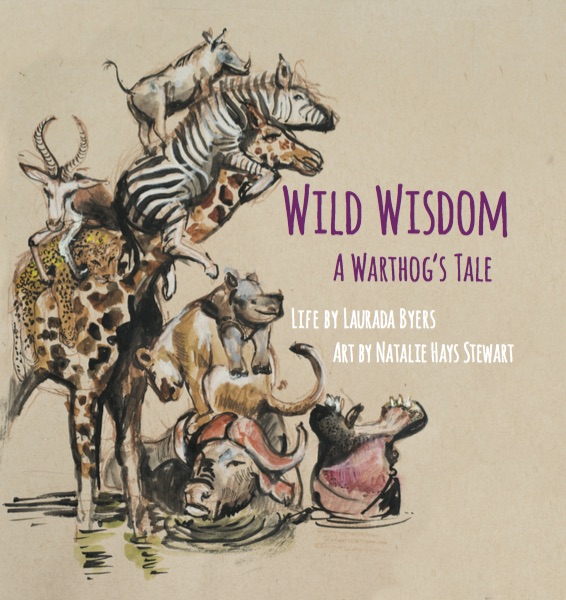When I first read Wild Wisdom, A Warthog’s Tale, I mistakenly took it for a children’s book. Look beyond the enchanting art work and you will find it is nothing of the sort. It’s a very adult book that uncovers the private thoughts and public decisions that Laurada Byers made in her remarkable life to find clarity during incredibly stressful events. When you know her story, it’s hard to imagine how someone can survive the trauma of the murder of her husband Russell, a well-known journalist, as well as anal cancer and Parkinson’s. All the while, she started a charter school and cared for her children.
You may be asking, why this book in Today’s Practitioner? May is Mental Health Awareness Month. Every patient who walks through your office is not only there for whatever ails them from the neck down, their emotions, mood and responses are just as important to whole-person wellness. It’s why I recommend that every integrative physician’s office carry a copy of Wild Wisdom, A Warthog’s Tale to use as a conversation starter for those many difficult health-crisis events that you and your patients encounter every day. Byers own physician, Dr. Susan Kellogg, has a copy in the waiting room, ready and waiting for the right moment to begin those hard-to-have conversations about communication, pain, side effects, trauma and mental health. The following is an interview with Laurada Byers, author of Wild Wisdom, A Warthog’s Tale.
Introduction / From an early age, Laurada Byers questioned her sense of self. A series of crises including the murder of her husband while she stood mere feet away, and bouts with cancer, Parkinson’s and PTSD, cast that doubt in a new, terrifying urgency. Suddenly, instead of feeling daunted by endless possibility, Laurada became paralyzed by a fear that she had no choice- she was always destined for tragedy.
Revisiting key turning points at various life stages, Laurada came to realize that her afflictions were not in fact the defining 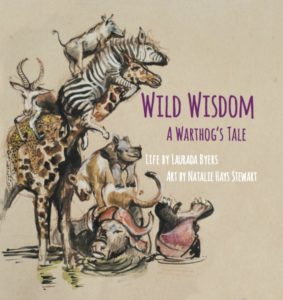 moments of her life. Where she ultimately finds freedom is in her reactions to these traumatic events. Laurada reveals how she found her footing through grief, and discovered her true identity in her resilience. Her story is captured through the movements of a scrappy warthog on the ruthless African savanna – who, full of warts and full of flaws, climbs out of its hole to face life head on– with tail up!
moments of her life. Where she ultimately finds freedom is in her reactions to these traumatic events. Laurada reveals how she found her footing through grief, and discovered her true identity in her resilience. Her story is captured through the movements of a scrappy warthog on the ruthless African savanna – who, full of warts and full of flaws, climbs out of its hole to face life head on– with tail up!
Wild Wisdom—A Warthog’s Tale is a beautifully illustrated graphic memoir that describes an uncommon life and the universal epiphanies that emerged from its hardships. Filled with humorously digestible visions of personal transformation, inspiration for overcoming obstacles, and love after loss, its rare honesty and grit is motivation for anyone who’s ever wallowed in the mud (and sometimes even enjoyed it).
TP: Your recently released book, Wild Wisdom, A Warthog’s Tale, is full of wonderful tidbits of wisdom from the warthog: “Compliant or engaged? Who Am I? … Only I can be responsible for my own life”; “Nobody told me about cancer’s collateral damage;” “Surviving isn’t enough, My goal is to thrive.” At the heart of the book is post traumatic stress disorder (PTSD), mental health and being very self aware of your thoughts and responses to everything that has happened. It’s hard to imagine how anyone could pull one’s self up from so many traumatic events. What did you and your doctors do to help you work through the grief, as well as the physical and mental pain?
Laurada Byers: Nothing! Truly no one talked about the mental health issues or gave me guidance on how to deal with PTSD. 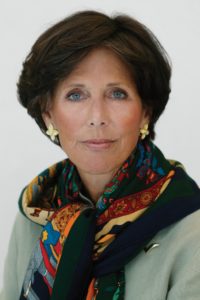 One psychiatrist mentioned offhandedly that I could have PTSD, but said nothing else. I went to seven different psychologists over the course of three years. I was obsessed that Russell’s murder was pre-determined so it was of great importance that I understood that it was a random act of violence and not pre-planned. The reason I founded the school was because I have an “activist personality” and needed something of significance to focus on after the murder. I also had just recently talked about founding a charter school and my husband Russell said, “you can’t do it because it’s too hard and you’ll never have a life”— that was also in the back of my mind.
One psychiatrist mentioned offhandedly that I could have PTSD, but said nothing else. I went to seven different psychologists over the course of three years. I was obsessed that Russell’s murder was pre-determined so it was of great importance that I understood that it was a random act of violence and not pre-planned. The reason I founded the school was because I have an “activist personality” and needed something of significance to focus on after the murder. I also had just recently talked about founding a charter school and my husband Russell said, “you can’t do it because it’s too hard and you’ll never have a life”— that was also in the back of my mind.
While I was struggling with PTSD no one suggested grief counseling.
Ten years after my husband was murdered and the school was becoming mature, I went to see his killer in jail to see if there was something I could learn to take back to school; well that visit sent me into terrible flashbacks and I found a new psychologist who finally helped me with PTSD. I held electric stimulators in my hands and she had me review in my head the murder scene. She taught me to view it as I would a silent movie which helped take the emotion out of the situation. It was if I was watching a movie but sitting in the audience, and not part of the film.
When I decided to write the book, I revisited all my doctors and learned new things, though no one has been able to help with the constant insomnia.
TP: Mental health issues can so easily spin out of control for so many reasons. What do you want physicians to know about how difficult it is to make those first steps toward getting help?
LB: So many doctors are focused singularly on their specialty. My neurologist was focused on Parkinson’s and I started taking 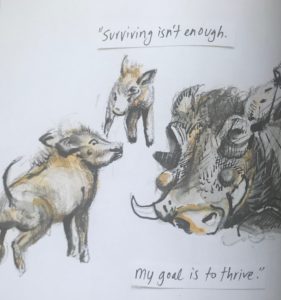 medications most of which were benign; however, one particular pill had side effects which impacted addiction centers in my brain. My doctor and I never discussed the mental health implications of being diagnosed with Parkinson’s which is a chronic disease which does get worse with time. The outward manifestation of my Parkinson’s was most notable in my dystonic foot However internal effects of Parkinson’s can be severe and include anxiety, low level of energy, depression, constipation and addiction. When I complained about the pills, the doctor just said “don’t worry, it’s worth the risk.” I am here to tell you it is not! Parkinson’s has numerous side effects which were not discussed with me. And how does age figure into long term Parkinson’s? I have experienced changes which include a softer voice, the loss of mobility in my face, shrinking handwriting, slow digestion and continued anxiety.
medications most of which were benign; however, one particular pill had side effects which impacted addiction centers in my brain. My doctor and I never discussed the mental health implications of being diagnosed with Parkinson’s which is a chronic disease which does get worse with time. The outward manifestation of my Parkinson’s was most notable in my dystonic foot However internal effects of Parkinson’s can be severe and include anxiety, low level of energy, depression, constipation and addiction. When I complained about the pills, the doctor just said “don’t worry, it’s worth the risk.” I am here to tell you it is not! Parkinson’s has numerous side effects which were not discussed with me. And how does age figure into long term Parkinson’s? I have experienced changes which include a softer voice, the loss of mobility in my face, shrinking handwriting, slow digestion and continued anxiety.
TP: Knowing what you know today – if you could go back and start over with conversations with your physicians, whether for cancer, Parkinson’s or PTSD, what would you say differently?
LB: Even though a doctor may be a specialist, they must treat the whole person or suggest a team approach to handle the different aspects of the disease. I now have a traditional doctor as well as a functional doctor. The latter gives me great advice about nutrition. Little did I know that I would suffer from inflammation due to my cancer treatment and a side effect is that I have new allergies and I am gluten sensitive. Even caffeine can cause terrible problems. No one told me!
Following my cancer treatment, the radiologist never told me my pelvis would fracture and that I would become lactose intolerant. I was told my cancer was treatable and curable but no one said I would have ghastly side effects for years. No one suggested I seek help for the after effects of the toxins being shot into my body. No one gave me help with the fractured pelvis or a shut vagina. In fact, a GYN physician said “fix it or I can’t give you a Pap smear!” Get it fixed … how?
It took me 5 years to find the wonderful Dr. Susan Kellogg who gave me vaginal shots to stretch the tissue that is scarred from radiology treatments. She found a cordless dilator (increases blood flow and relaxes muscles), which has been very helpful. I mention it on my website to help other women who are as lost as I was. I also have a physical therapist who spends 40 minutes a week stretching my pelvic floor.
TP: Tell readers more about the resources on your website to help women with the side effects of cancer and the International Society for the Study of Women’s Sex Health (http://www.isswsh.org).
All these various treatments had a devastating impact on my quality of life; and while it has taken me 20 years to find the various resources, I do not want any other woman to spend 20 years looking for answers. That is why I have added many resources to my website in order to share what I have learned with others.
I learned that you need to start immediately to find help. Scar tissue (even from Caesareans or other abdominal surgery) impacts 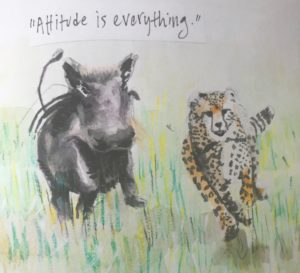 your bladder, digestion and the pelvic floor; and these are all areas which need immediate treatment. I found a wonderful Physician’s Assistant who is like my female Santa. She gives me shots and suppositories to help with the scarring. A team approach is the only way to deal with all the various effects and one important addition I learned recently is to have a pharmacist as part of the group, hopefully providing a pill calendar to assure proper timing, what to take with food and explain side effects..
your bladder, digestion and the pelvic floor; and these are all areas which need immediate treatment. I found a wonderful Physician’s Assistant who is like my female Santa. She gives me shots and suppositories to help with the scarring. A team approach is the only way to deal with all the various effects and one important addition I learned recently is to have a pharmacist as part of the group, hopefully providing a pill calendar to assure proper timing, what to take with food and explain side effects..
It would have also been most helpful to have the various doctors inquire about my learning style. I am a visual not an auditory learner so medical information is difficult to take in. I also encourage patients to have an advocate who will listen and ask about various issues that the patient might not be able to focus on at the time. Also, a curator to guide us through the internet so that the first few links which pop up are giving us the right information not what a pharmaceutical firm wants us to know or purchase.
I was widowed at the age of 50 and was not ready to close up shop. It wasn’t so much about sex as it was about having choices. Aren’t endorphins an important part of life? Studies have demonstrated that human and diverse animal tissues are capable of producing a natural morphine, which has been continually researched for their pain relieving properties and their role in the feeling of pleasure. Pain relief and pleasure would be most welcome in my life!
For more information on Laurada Byers click here. To learn more and purchase Wild Wisdom, click here.
Click here for resources on pelvic pain on Laurada Byers’ website.
 Laurada Byers has braved cancer, Parkinson’s disease, and PTSD. She is the founder of the Russell Byers Charter School, which she opened in 2001 with her children, Alison Byers and Russell Byers Jr., as a tribute to her late husband, a well-known Philadelphia Daily News columnist who was murdered by her side at a convenience store in 1999. Byers is also the founder of Warthog Productions, named after her favorite animal who unabashedly bears life’s ugly for all to see. As a published author of Book of Blessings: Graces from Around the World and Wild Wisdom: A Warthog’s Tale, she connects to contemporary women and men alike through her focus on grief, grit, and gratitude.
Laurada Byers has braved cancer, Parkinson’s disease, and PTSD. She is the founder of the Russell Byers Charter School, which she opened in 2001 with her children, Alison Byers and Russell Byers Jr., as a tribute to her late husband, a well-known Philadelphia Daily News columnist who was murdered by her side at a convenience store in 1999. Byers is also the founder of Warthog Productions, named after her favorite animal who unabashedly bears life’s ugly for all to see. As a published author of Book of Blessings: Graces from Around the World and Wild Wisdom: A Warthog’s Tale, she connects to contemporary women and men alike through her focus on grief, grit, and gratitude.
Notes on pelvic pain: According to the NIH: Because pelvic pain is often linked to other disorders, such as endometriosis or vulvodynia, chronic pelvic pain may be misdiagnosed as another condition, making it difficult to estimate reliable prevalence rates for pelvic pain.1 According to one study, about 15% of women of childbearing age in the United States reported having pelvic pain that lasted at least 6 months.2 Worldwide, the rates of chronic pelvic pain for women of childbearing age range from 14% to 32%.2 Between 13% and 32% of these women have pain that is severe enough to cause them to miss work.3

